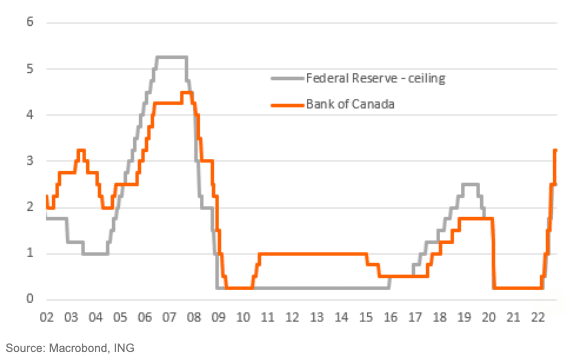Canadian Dollar: Bank of Canada Hikes 75bp, But Looks Ready to Slowdown
- Written by: Gary Howes

Above: File image of BoC Governor Tiff Macklem. Source: Bank of Canada.
The Bank of Canada increases policy interest rate by 75 basis points to 3.25%, but it is becoming increasingly clear it is ready to slowdown its pace of hikes.
The Canadian Dollar was relatively subdued following the decision and guidance, falling back against the U.S. Dollar, Euro and most other major currencies.
Its only gains were against the terminally ill Pound and yield-starved Japanese Yen, which therefore confirms a distinct flavour of under-performance.
The Canadian Dollar's lacklustre response suggests the outcome and guidance was in line with analyst expectations and that the balance is tipping in favour of a slowing in the pace of its rate hiking programme.
The Bank of Canada says it will continue to raise interest rates as domestic inflation, excluding gasoline prices, continues to increase and data indicates a further broadening of price pressures, particularly in services.
The Bank’s core measures of inflation continued to move up, ranging from 5% to 5.5% in July.
The Bank said it noted surveys suggest short-term inflation expectations remain high and the longer this continues, the greater the risk that elevated inflation becomes entrenched.
"Given the outlook for inflation, the Governing Council still judges that the policy interest rate will need to rise further," said the Bank of Canada in a statement.
Compare GBP to CAD Exchange Rates
Find out how much you could save on your pound to Canadian dollar transfer
Potential saving vs high street banks:
C$4,450.00
Free • No obligation • Takes 2 minutes
But interest rates are now above the level it considers a neutral level (2-3%), ie. they are no longer stimulatory and are in fact contractionary.
"Further hikes are coming, but likely at a slower pace," says James Knightley, Chief International Economist at ING.
ING sees a further 75bp of hikes by year-end which implies materially smaller incoming hikes.
"This will take the policy rate to 4% and we believe this will mark the peak," says Knightley.
The U.S. Dollar-Canadian Dollar exchange rate was seen higher at 1.3177 in the minutes following the decision, the Pound-Canadian Dollar was meanwhile seen at 1.51.
"A front-end loaded strategy for rate hikes is designed to take rates up quickly, but also behooves the central bank to pause at some point to see how the economy is coping, given that there is a lag in seeing that response in growth, and an even longer lag for its impacts on inflation," says economist Avery Shenfeld at CIBC Capital Markets.

Above: BoC rates vs. Federal Reserve rates. That the BoC has kept up with the Fed has aided CAD in 2022.
Economists at RBC say the pace of hikes is likely to slow from here as the Bank of Canada reiterated its expectation that growth will moderate in the second half of the year.
"The BoC is hoping to pull that off without tipping the economy into recession, though getting inflation under control remains its top priority. We continue to expect a mild recession in 2023," says Josh Nye, Senior Economist at RBC Economics.
The Canadian Dollar remains 2022's second-best performing currency, in part because the Bank of Canada has been bold and proactive in its approach to fighting inflation.
But other factors could increasingly influence the currency going forward as the BoC slows down, these include global oil prices and decisions taken at the Federal Reserve.
Compare GBP to CAD Exchange Rates
Find out how much you could save on your pound to Canadian dollar transfer
Potential saving vs high street banks:
C$4,450.00
Free • No obligation • Takes 2 minutes




